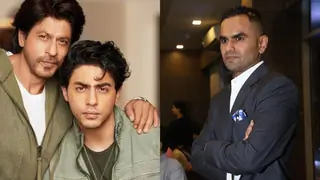This article is written by Raju Bharatan for The Illustrated Weekly of India, Aug 93.
Could you believe that end-July signalled full 13 luckless years without the charismatic voice of Mohd. Rafi? I, for one, couldn't believe it, if only because I discerned that it was during these very 13 tuneless years that Rafi had grown more dominant in our vocal imaginations. Whether it be TV or radio, his vocals have been even more vibrant in the years he has been away from us. Shabbir KUmar, Anwar, Mohd. Aziz, their performing stature dimin- ishes with every year that passes without Rafi.
So unique is Rafi's vocal mystique that he is always throwing up new areas, for example, not one anniversary article on Rafi touched on how this big-hearted tenor *made* small-time composers. It is this lacuna we now seek to fill in a resonant replyof some Rafi's all-time hits for the lesser-known music directors. The idea is to spotlight Rafi's role in keeping the small-time composer professionally alive.
Remember an obscure 1953 C-grade film called Khoj for which music was scored by Nissar Baazmi, the man who later went to Pakistan and became such a big composer there that even Noorjehan and Mehdi Hassan considered it an honour to sing for him. Yet so long as Nissar Baazmi was in India, he somehow remained a C-grade composer. And at the time he did Khoj, he was literally a nobody.
This was when Baazmi approached Rafi to sing for the maximum Rs 50 that his producer could afford for the rendition of a composition on which he prided himself. And Rafi charged Baazmi just the token Re 1 to produce for him, in Khoj, the memorable Radio Ceylon hit, Chanda ka dil toot gaya roney lage hain sitaare. This Raja Mehdi Ali Khan lyric began with the cry: Mohabbat aur wafaa kis tarah tauheen ki tu ne. What a compelling sense of expression Rafi brought to this tune of a struggling composer!
Nor was Pandit Shivram a big-time composer when Rafi (this time for Rs 50) obliged him with an all-time hit that made its way from Radio Ceylon to the Binaca Geetmala. It was written by Bharat Vyas (for a shoestring-budget starrer of Nirupa Roy, Karan Dewan and Bhagwan) and it became, in Rafi's orotund voice, the surprise hit of the year 1955. My reference is to the Oonchi Haveli Rafi chartbuster: Daulat ke jhoote nashe main ho choor garibon ki duniyan se rehte ho door. Who but Rafi could have scaled such a vocal peak from the pit-class for which Oonchi Haveli was made? To this day, Daulat ke jhoote nashe main ho choor remains the biggest hit given by Pandit Shivram.
S. Mohinder may not exactly have been a C-grade composer, but the fact remains that he rarely worked in A-grade set-ups. Ranjit's Papi, starring Nargis and Raj Kapoor, was one of those rare films in which S. Mohinder had the support of a hit star-team. But the problem was that, but the time Papi came in 1953, Mukesh was settled as the voice of Raj Kapoor. Even so Sardar Mohinder made bold to opt for Rafi for Raj! And that too in the climax of Papi!
Only, by the time the climax of Papi came to be reached, the film had already been dismissed by the audience as a visual disaster. Yet the same audience which, I remember, had virtually gone to sleep in Delhi's Regal Cinema came to sudden life and began tapping its feet to the Rafi rhythm of Tera kaam hai jalna parwaane chahe shama jale ya na jale.
That audience clearly felt that Rafi was made for Raj Kapoor. Who knows, Rafi, given the chance, might have been good on Raj Kapoor too! Come Dilip Kumar, come Raj Kapoor, come Dev Anand, Rafi was a vocal match for any hero, big or small.
The hero of Mirza Ghalib was Bharat Bhooshan, the hero in Devdas was Dilip Kumar. And both heroes in both films had plumped for the soft vocals of Talat Mahmood. Rafi therefore had only one atmospheric song each in these two films. Yet, even in these two films in which Talat dominated so sentimentally, Rafi left his own distinct individual impact - under Ghulam Mohammad with Hai has ki har ek unke ishare mein nishaan aur (Mirza Ghalib), under Dada Burman with Manzil ki chaah mein (Devdas). Neither Talat, nor Mukesh, nor Kishore, nor Hemant, nor even Manna Dey, could ever take Rafi for granted. I might have been better trained classically by my uncle K. C. Dey, Manna once told me, but if Rafi was singing in the same film as I was, I never could be sure he wouldn't overtake me.
The same Manna Dey had given of his best to the hapless composer, Babul, in Reshmi Roomal, through Zulfon ki ghata lekar saawan ki pari aaye (with Asha) and Aankh mein shokhi lab pe tabassum (with Suman). In the same Reshmi Roomal, Babul had made a telling impression with Talat, too, through Jab chhaye kabhi saawan ki ghata. Therefore, since Mukesh too had scored in the same Reshmi Roomal through Gardish mein ho taare, there was no reason for Babul to switch to Rafi when he came to scoring Naqli Nawaab on the same Manoj Kumar. Yet Babul did switch to Rafi. And somewhere at the back of his mind, Rafi must have known that, in Babul's recording room, the competition was with Talat, Mukesh and Manna Dey alike. Therefore regardless of the fact that he was now being paid only Rs 200 for each song in Naqli Nawab, Rafi came up, for Babul, with such heart-stealers as Tum poochhte ho ishq bala hai ke nahin hai and Allah jaane maula jaane.
Nor was Rafi's best reserved for just Babul, who had broken away from the team of Bipin-Babul. Rafi produced for Bipin (Datta) too, in Yeh Bambai Hai the N53097 two sided hit: Yeh bambai shehar ka bada naam hai.
Likewise, G.S. Kohli never rose above the B-grade film. Yet, given the aid of Rafi's vocals, Kohli was able to come up, in Lambe Haath, with an all-time hit, for our super-patriotic Vividh Bharathi, in the form of Pyaar ki raah dikha duniya ko. The message in this Lambe Haath hit, Tum mein hi koyi Gautam honga tum mein hi koyi Gandhi, remains distinctly RAFIan.
G. S. Kohli was at least a name that appeared on the banner of half a dozen films. But Dulal Sen, you saw his name on the banner of only one film Black Prince. Yet even in that one film, what depth of feeling Rafi brought to the rendition of Dulal Sen's Nigahen na phero chale haayenge hum, as put over by Rafi for Dulal Sen in Black Prince, that lingers in Radio Ceylon memory.
It was Shivkumar Saroj, the sensitive Radio Ceylon announcer, who drew our attention first to the tuning artistry of another modest composer: C Arjun. When I met C Arjun much later, he told me that he felt very proud that he had at least created a ghazal that could come somewhere near a Madan Mohan composition. I wanted special attention to this my coveted ghazal from my singer but all good singers available were bigger than the film for which I had composed it! revealed Arjun. It was with great hesitation, therefore, that I approached Rafi Saab to render my ghazal, so feelingly written by Indivar. And Rafi Saab, without bothering about the small payment we were in a position to make, said it was one of the best ghazals that had fallen to his lot and he would give it everything that he had.
Rafi certainly gave that C Arjun ghazal everything he had, that is how it came over to us Paas baitho tabiyat behal jaayegi maut bhi aa gayi to hal jaayegi in Punarmilan. This ghazal proves, if proof is needed, that no composer was too small for Rafi as long as the composition was great. After all, who were Lala-Asad-Sattar but three instrumentalists who had turned music directors. Yet for even such a stunt trio trying to combine as a music director team, Rafi proved a salvation with such a surpassingly lovely solo in Sangram as Main to tere haseen khayalon mein kho gaya.
To help every little composer trying to gain a toe-hold in the quicksands of filmdom was Rafi's singing philosophy. Sapan Jagmohan, as a duo, got their break in Sadashiv Row Kavi's Begaana, with Suprita Chowdhury. It was Sapan-Jagmohan's first film and the two had to show spot results to make headway.
Jagmohan (of this team) had sung 10 years earlier, in Kishore Sahu's Hamlet, the hit duet with Rafi Ghir ghir aaye badarvaa re kaare. On the strength of this connection, Jagmohan (Bakshi) approached Rafi to render what Sapan-Jagmohan felt was their prize composition in Begaana. And Rafi made this prize composition unforgettable as one he could by articulating it as Phir woh bhooli si yaad aayee hai. Remember, Phir woh bhooli si yaad aayee hai was just a good composition in the hands of Sapan Jagmohan. It was left to Rafi to immortalise it as Sapan Jagmohan's best ever composition by rendering it in a style no singer could excel.
Annu's father Sardar Maalik, though highly talented, never made it to the big league. Bachpan therefore was just another pulp film for which Sardar Maalik was scoring the music. And it would have been forgotten as just another potboiler churned out by our industry, but for Rafi, under Sardar's baton, arrested our attention with Mujhe tum se mohabbat hai magar main keh nahin sakta.
The tune came first, the money after, in the case of Rafi. But for the instinctually generous way in which Rafi adjusted his charges for the small composer, we would have not got, in his voice, from Iqbal Quraishi Subah na aaye shaam na aaye from Cha Cha Cha, not from Sonik-Omi Dono ne kiya tha pyaar magar mujhe yaad raha tu bhool gayi meri from Mahua.
In the rare film in which Prem Dhavan doubled as song writer and song composer, like in Pavitra Papi, Rafi came up with a memorable hit for him like Allah hi Allah kar pyare Allah hi Allah.
The Rafi touch it could turn any disc into gold!









 In the film " Lal patthar"(1971), Shankar jaikishan had composed for Rafi " unke khayal aye to ate chaale gaye" in raag gara. There the nostalgic mood of badshah was presented by Rafi. Other quality creations of Shankar Jaikishan included " Aji ruth kar ab kahan jaiyega" in raag desh in Aarzoo (1966) starring Rajender kumar, " Khuda bhi asma se jab zamin par dekhta hoga" in the film "Dharti," " mujhko apne gale lagalo ai mere humrahi" ( Humrahi, 1962) "surahidar gardan koel sihi awaz" in the film " Aman". The lyrics were written by Hasrat Jaipuri.
In the film " Lal patthar"(1971), Shankar jaikishan had composed for Rafi " unke khayal aye to ate chaale gaye" in raag gara. There the nostalgic mood of badshah was presented by Rafi. Other quality creations of Shankar Jaikishan included " Aji ruth kar ab kahan jaiyega" in raag desh in Aarzoo (1966) starring Rajender kumar, " Khuda bhi asma se jab zamin par dekhta hoga" in the film "Dharti," " mujhko apne gale lagalo ai mere humrahi" ( Humrahi, 1962) "surahidar gardan koel sihi awaz" in the film " Aman". The lyrics were written by Hasrat Jaipuri.

















